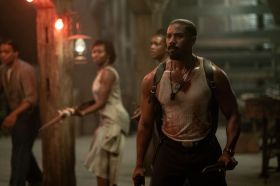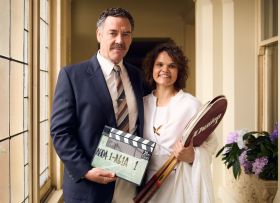For someone without sight, it is the little things that matter: the cups of tea made, outfits chosen, and other milestones in their daily routine. Each seemingly mundane task comes laden with dual outcomes and raised stakes, their completion cause for celebration and their floundering carrying the weight of crushing defeat. It is here, in the sliver of possibility between success and failure, and in the heightened awareness of every non-visual sensation, that writer turned first-time filmmaker Eskil Vogt (Oslo, August 31st) establishes his film. Blind is a nest of messy minutiae with the potential to make or break its protagonist’s fragile existence.
After losing her vision as an adult, Ingrid (Ellen Dorrit Petersen, King of Devil’s Island) finds a life lived in perpetual darkness understandably taxing, to the detriment of more than just her wellbeing. As she retreats into her apartment, lacking the desire to attempt to venture outside, her marriage to architect Morten (Henrik Rafaelsen, Happy, Happy) threatens to become a casualty. Via narration, Ingrid conveys her frustrations, but soon her words turn to the plights of others too. Einar (Marius Kolbenstvedt, Brun bitter) compulsively masturbates in the absence of the companionship and connection he so desperately wants, increasingly spying on those in his neighbourhood. Lonely Swedish single mother Elin (Vera Vitali, Waltz for Monica) earns his attentions, but sets her sights on a married man.
Part emotional drama, part heartfelt comedy, Blind is not a horror film in any sense of the word – but finds its strengths in one of the basics of the genre. What can be imagined is often worse than what is seen, as Ingrid is forced to discover, and as Vogt thrusts on the audience in a clever and finely crafted exploration of creating an inner world when everything outside is steeped in darkness. Truth is an elastic concept as the protagonist works through her issues, the film projecting her insecurities and anxieties into its frames. As Ingrid so aptly espouses in the film’s introductory phase, ‘it’s not important what’s real as long as I can visualise it.’
It is a compliment to the film that the works of Spike Jonze and Charlie Kaufman earn mentioning in the same breath, as does Stranger than Fiction and Ruby Sparks; however Blind is no mere appropriation of narrative playfulness seen several times before, nor is it driven by gimmickry. As the feature teases its device for bringing all four characters into the same story, it is its reliance on the details that expands its delicate rendering of Ingrid’s predicament. Blind asks viewers to notice the fluidity in all the small things that comprise the complete scenario, to piece together its sensitive puzzle, and rewards close scrutiny.
Cinematographer Thimios Bakatakis, a veteran of Dogtooth and Attenberg, bears much of the brunt of responsibility for effectively enacting the film’s enigma, fittingly as wryly reliant on what is seen as a film about the subject can be. His efforts work in tandem with the performance of Petersen, the latter the wound-up coil, the former the unleashed energy springing free. Where the camera dwells pointedly and precisely on specific objects, Petersen enacts Ingrid as manically stoic and restlessly uncertain. Their pairing perfects the broader atmosphere of yearning and observing, of lingering and longing to stem the unease.
Though Petersen rightfully monopolises focus, her troika of co-stars do more than just support or just conform to one plain type. Rafaelsen’s Morten is an antagonist in idea only as the sum of Ingrid’s swirling doubts, and is played as such. Kolbenstvedt’s Einar and Vitali’s Elin act as surrogates for portions of Ingrid’s personality, yet are never sketched simply or without subtlety. This is the web that Vogt continues to weave, whether in an opening that boils fumbling around without vision down to its most procedural steps, or in crisp, calm imagery that uses its toying with the elements to build to a point of catharsis, or in portrayals that form a cohesive whole not only by design but through the layering of difference. Indeed, Blind proves anything but the meaning its moniker screams, in a perceptive portrait of the seen and unseen.
Rating: 4 out of 5 stars
Blind
Director: Eskil Vogt
Norway, 2014, 96 mins
Melbourne International Film Festival
www.miff.com.au
31 July – 17 August
Actors:
Director:
Format:
Country:
Release:





